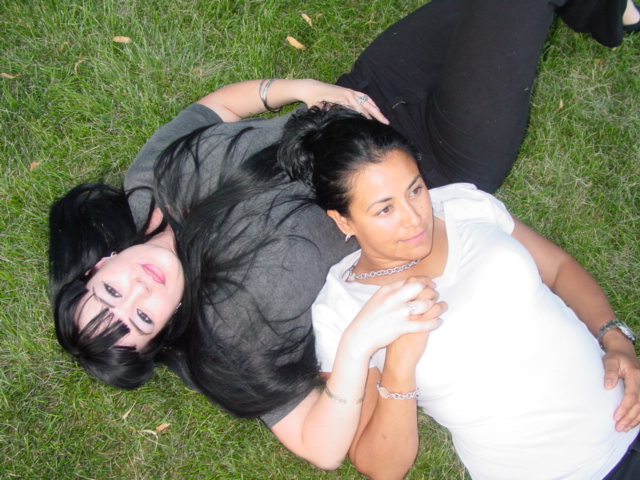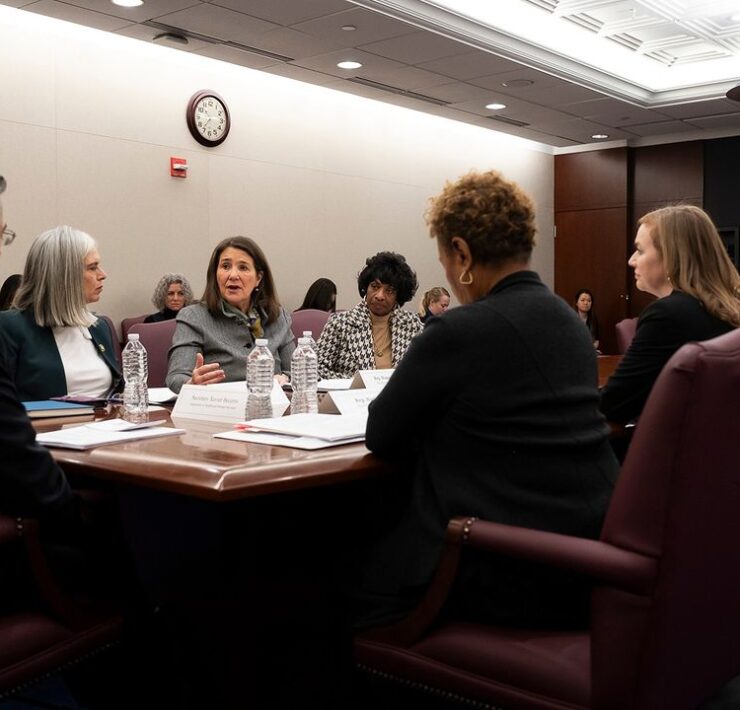Denver lesbian faces deportation Aug. 19, wife helpless because of DOMA


The old adage goes, “love knows no bounds.”
That is, unless you’re a lesbian binational couple living in the United States — like Violeta and Sujey Pando.
One half of the couple — Sujey — faces deportation Aug. 19 unless an immigration judge grants her plea for asylum.
Because both parties of this marriage are female, Violeta can’t sponsor Sujey, an illegal immigrant, for citizenship. Standing in the way of this couple is the federal Defense of Marriage Act that defines marriage between a man and a woman, effectively muting all state recognized marriages when it comes to issues like immigration.
While the fight might end in Courtroom A at 621 17th St., for this Denver couple, married Nov. 15, 2010 in Des Monies, Iowa, it all started in Chihuahua, Mexico. That’s where Sujey was abandoned by her mother, raised by her grandmother, tormented by her brothers and raped by her uncle.
It was years of torture for Sujey.
“The Latino culture doesn’t see homosexuality well,” she said. “My family pushed me away.”
She was ostracized by her family — kicked out of her home in Mexico for three days — and her mother who married a U.S. citizen never mentioned she had a daughter to her husband.
“When I called, he had no indication of who I was,” she said. “She never told him about me.”
No one wanted her.
But when she was 16, Sujey’s mother and stepfather — strangers — snuck her and her brothers to live with them in United States without a passport or a visa.
The first stop was Oklahoma. Shortly there after, the family migrated to Denver. While her brothers were enrolled in school, Sujey took on household duties. She was the proverbial maid. She was charged with cooking and cleaning.
“It was like living with strangers.”
In what little spare time she had, she took odd jobs for her neighbors. She had work, but no support system, no friends. As she learned English, one of the neighbors connected her with a job. There she met co-workers who were like her: lesbians.
They helped her get to and from work. Showed her around Denver. Worked on her English.
And just as Sujey, then 17, was becoming more accustomed to her new life in Denver, she returned home from work to find she was locked out.
“It was funny. All of my stuff was on the lawn,” she said. “I thought my family might be painting. But the door was locked. My mother came to the door and told me I didn’t need to live with her anymore because I had my job and my new gay friends.”
Her co-worker and her girlfriend took her in for three days.
“It was frightening. There were no neighbors. There were no cousins.”
It was then Sujey met the woman she calls “one of the biggest angels.” One of her managers, Diane Ramirez, rented Sujey a spare bedroom.
“We built such a great relationship,” Sujey said. “God put her on my side.”
Ramirez introduced Sujey to other lesbians around town. They perfected her English — save her thick accent — and taught her how to drive. But more importantly, they gave her a place to belong.
“The gay community was so helpful,” she said. “Our community has such a big heart. Big love. This is where I get help from.”
Life continued to improve for Sujey. She followed Ramirez to other jobs. And in 2006 she met Violeta.

The two met at the now defunct Safari Nightclub, exchanged phone numbers and began to text and chat. The next day they had their first date.
“It was like cupid’s arrow,” Sujey said. “My soul mate was there.”
“I’m a pet person,” Violeta said. “She had pets. She loved my pets. I loved her pets. They loved each other. It was a big plus.”
Sujey told Violeta about her immigration status. The two researched options but Sujey’s only hope, her mother — who had already naturalized her brothers — refused to naturalize her lesbian daughter.
They continued to live with this secret.
And they were inseparable.
Until Sujey was stopped for a traffic violation in 2008. It was then the government discovered she was here illegally. She was taken into custody by the U.S. Immigration and Customs Enforcement agency. She was imprisoned for nearly three months.
“When she got pulled over, it was a nightmare,” Violeta said. “They treat child molesters and murders better than illegal aliens.
“It was night after night of crying to each other.”
Violeta, then a college student, began searching the Internet for answers, ideas, lawyers.
She found one, Lilian Shea, and the trio began to prepare. The first step was to buy time by filing for extensions.
Nearly three years later, this duo is exhausted from worrying, researching and are strapped for cash. They’ve already paid nearly $20,000 in fines and legal fees.
Sujey appeared before a judge in January. They argued she suffers from Posttraumatic Stress Disorder and returning to Mexico would cause her great harm. The judge postponed her ruling until Aug. 19.
All Sujey and Violeta want to do is become foster parents and run a shelter for stray animals.
“I didn’t have a father. I didn’t have a mother,” Sujey said. “It makes me think ‘how many kids grow up like I did: no one to give them a hug.’”
But before any animals can be rescued or children adopted, Sujey must learn her fate.
The good news: this isn’t a lost cause.
“The June 17 prosecutorial discretion guidelines issued by ICE Director, John Morton, which directs all ICE attorneys to take into account such issues as family unity, strong ties to community and the humanitarian circumstances of individual cases, can be enormously helpful to lesbian and gay couples, like Violeta and Sujey, who clearly qualify on multiple grounds for such discretion,” said Lavi Soloway founder of Stop The Deportations – The DOMA Project.
But, “We have no national policy from this White House that specifically directs Immigration Judges and ICE prosecutors to halt deportation proceedings of spouses of lesbian and gay Americans until DOMA has been repealed by Congress or struck down by the Supreme Court,” he said. “In the absence of such a policy, every case will be a cliffhanger and no same-sex binational couple will be safe.”
Cliffhanger is an understatement.
“DOMA is destroying my family,” Violeta said. “They want to take my wife away. They don’t care they’re tearing families apart. Why would they do that?”
Moreover, Sujey and Violeta are doubling down their case.
Earlier this month, Sujey and Violeta also applied to the judge for “Cancellation of Removal,” an application which the judge can entertain, but which normally would require a new hearing.
“Since Cancellation of Removal is a specific kind of application for permanent residence that is, in this case, based on hardship to Violeta as Sujey’s spouse, it once again depends on how the issue of DOMA is approached,” Soloway said.
A case currently at the Board of Immigration Appeals involves a gay couple seeking Cancellation of Removal in which the attorney general intervened April 26 to determine whether a same-sex partner could be considered a “spouse” for immigration purposes, Soloway said.
“Given that case is still pending, Violeta and Sujey are hopeful that if the deportation hearing cannot be resolved successfully on the basis of the asylum case, that the judge and the government prosecutor will at least give them an opportunity to make a similar argument.”
“I don’t know why they can’t do it in Colorado,” Violeta said.
If worse comes to worse, Sujey could be barred from entering the United States for 10 years. Violeta said moving to Mexico with Sujey is an option. But not a realistic one. Together, they don’t have more than $100 to finance a move.
“I need my wife with me,” Violeta said. “She can’t live in Mexico. I can’t be without her. It’d destroy my life.”
The couple is trying to stay positive. They take walks in a park nearby their home in east Denver. They force themselves to talk about anything but the judge’s ruling.
I had to ask Sujey if she believes she is in this country illegally. Is she an illegal immigrant?

“I understand the law,” she said. “But at the point I came here, I didn’t have a choice. When you’re 16, it’s very hard. I was a skinny little girl being beaten. I couldn’t go to the police. If I did, I was told I would be killed the next time. My mind wasn’t in the right place. I was brutalized. I thought I should just die. You don’t know what the law is. To me that doesn’t make me a criminal. I was waiting for a door to open to pull me out of my misery. I just thought I had to survive.
“I would do it again. I consider myself a survivor.”
Sujey and Violeta plan to survive this fight — perhaps the hardest either will ever endure — together.
“Every law on the books is against us,” Violeta said.
Soloway echoes.
“Full equality will only come when DOMA is repealed by Congress or struck down by the Supreme Court,” he said. “Once that happens, the Immigration and Nationality Act, which provides for Americans to sponsor their foreign-born spouses, would apply to all marriages. We have to bring an end to DOMA. Uniting American Families Act, which I helped write when it was known as the Permanent Partners Immigration Act, would create a ‘partner’ category in the Immigration Act, but would fall short of full equality because it would not give lesbian and gay couples 100 percent of the immigration rights and protections enjoyed by opposite-sex couples.”
But Sujey continues to smile.
“We have a lot of dreams like any other couple,” Sujey said. “Finally, I have my own family.”
And while in this case, love may know the boundaries of the United States, we can only hope it will conquer all.
What can you do to help?
The community can focus on two actions, Lavi Soloway said. First, contact your elected officials in Denver and Washington: Rep. Diana DeGette (202-225-4431 or 303-844-4988) and Sen. Michael Bennet (202-224-5852 or 303-455-7600) and Mark Udall (202-224-5941 or 303-650-7820) and ask them to contact the Department of Homeland Security to stop this deportation. You can also sign our petition here to President Barack Obama calling on the White House to issue a moratorium on all deportations of spouses of lesbian and gay Americans.
What's Your Reaction?
Out Front contributor Nic Garcia is a lifelong journalist and works for Colorado education policy news organization EdNewsColorado. He was an Out Front managing editor, associate publisher and executive editor from 2011 to 2013.










